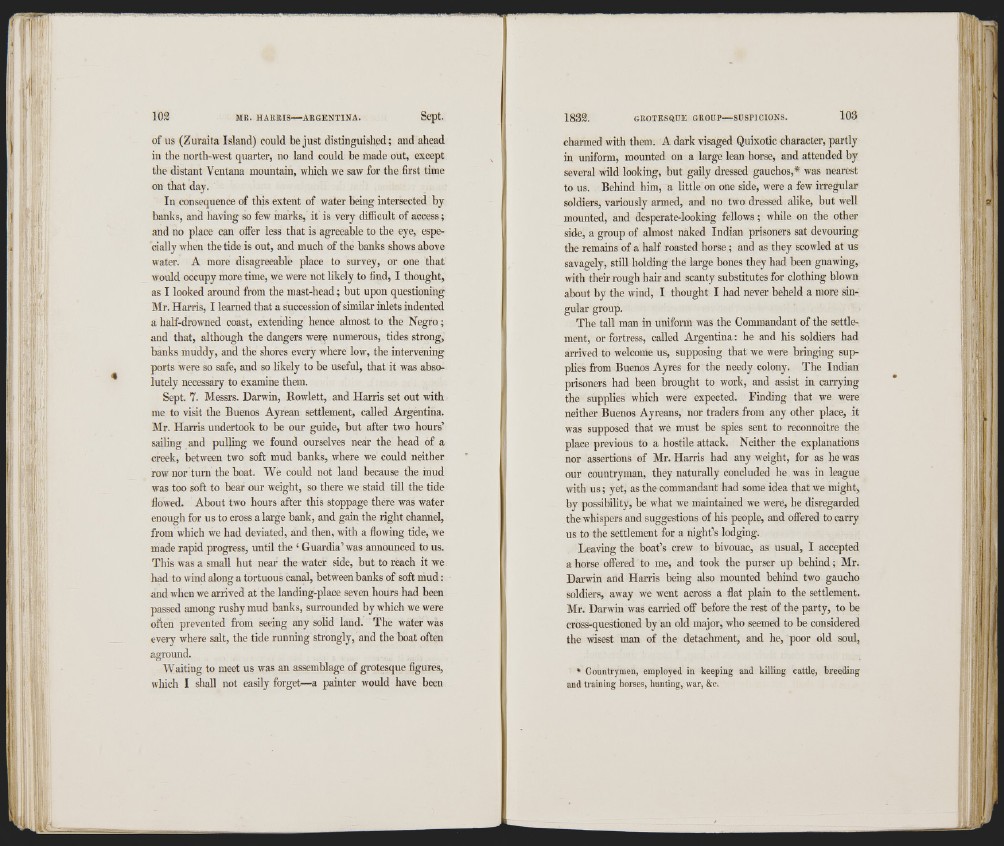
,1
of US (Zuraita Island) could be just distinguished; and ahead
in the north-west quarter, no land could be made out, except
the distant Ventana mountain, which we saw for the first time
on that day.
In consequence of this extent of water being intersected by
banks, and having so few marks, it is very difficult of access;
and no place can offer less that is agreeable to the eye, especially
when the tide is out, and much of the banks shows above
water. A more disagreeable place to survey, or one that
would occupy more time, we were not likely to find, 1 thought,
as 1 looked around from the mast-head; but upon questioning
Mr. Harris, 1 learned that a succession of similar inlets indented
a half-drowned coast, extending hence almost to the Negro;
and that, although the dangers were numerous, tides strong,
banks muddy, and the shores every where low, the intervening
ports were so safe, and so likely to be useful, that it was absolutely
necessary to examine them.
Sept. 7. Messrs. Darwin, Rowlett, and Harris set out with
me to visit the Buenos Ayrean settlement, called Argentina.
Mr. Harris undertook to be our guide, but after two hours’
sailing and pulling we found ourselves near the head of a
creek, between two soft mud banks, where we could neither
row nor turn the boat. We could not land because the mud
was too soft to bear our weight, so there we staid till the tide
flowed. About two hours after this stoppage there was water
enough for us to cross a large bank, and gain the right channel,
from which we had deviated, and then, with a flowing tide, we
made rapid progress, until the ‘ Guardia’ was announced to us.
This was a small hut near the water side, hut to reach it we
had to wind along a tortuous canal, between banks of soft m ud:
and when we arrived at the landing-place seven hours had been
passed among rushy mud hanks, surrounded by which we were
often prevented from seeing any solid land. The water was
every where salt, the tide running strongly, and the boat often
aground.
AVaiting to meet us was an assemblage of grotesque figures,
wliich I shall not easily forget—a painter would have been
: ri
charmed with them. A dark visaged Quixotic character, partly
in uniform, mounted on a large lean horse, and attended by
several wild looking, but gaily dressed gauchos,* was nearest
to us. Behind him, a little on one side, were a few irregular
soldiers, variously armed, and no two dressed alike, but well
mounted, and desperate-looking fellows; while on the other
side, a group of almost naked Indian prisoners sat devouring
the remains of a half roasted horse ; and as they scowled at us
savagely, still holding the large bones they had been gnawing,
with their rough hair and scanty substitutes for clothing blown
about by the wind, I thought I had never beheld a more singular
group.
The tall man in uniform was the Commandant of the settlement,
or fortress, called Argentina: he and his soldiers had
arrived to welcome us, supposing that we were bringing supplies
from Buenos Ayres for the needy colony. The Indian
prisoners had been brought to work, and assist in carrying
the supplies which were expected. Finding that we were
neither Buenos Ayreans, nor traders from any other place, it
was supposed that we must be spies sent to reconnoitre the
place previous to a hostile attack. Neither the explanations
nor assertions of Mr. Harris had any weight, for as he was
our countryman, they naturally concluded he w'as in league
with u s ; yet, as the commandant had some idea that we might,
by possibility, be what we maintained we were, he disregarded
the whispers and suggestions of his people, and offered to carry
us to the settlement for a night’s lodging.
Leaving the boat’s crew to bivouac, as usual, I accepted
a horse offered to me, and took the purser up behind; Mr.
Darwin and Harris being also mounted behind two gaucho
soldiers, away we went across a flat plain to the settlement.
Mr. Darwin was carried off before the rest of the party, to be
cross-questioned by an old major, who seemed to be considered
the wisest man of the detachment, and he, poor old soul.
j'f'
k ’•
i !
li
• Countrymen, employed in keeping and killing cattle, breeding
and training horses, hunting, Avar, &c.
Ì! M! | '